Find Help
More Items From Ergsy search
-
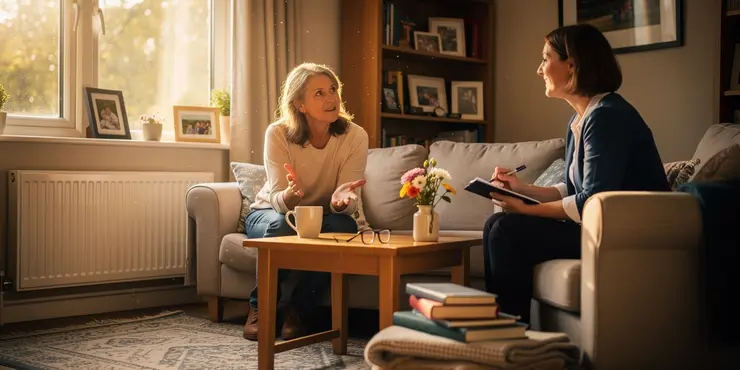
Joan's story - Aphasia Awareness
Relevance: 100%
-
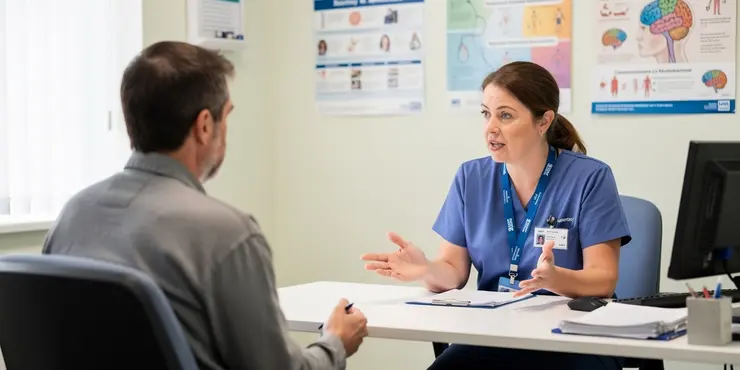
South Tees NHS - What is aphasia and how can you help?
Relevance: 87%
-
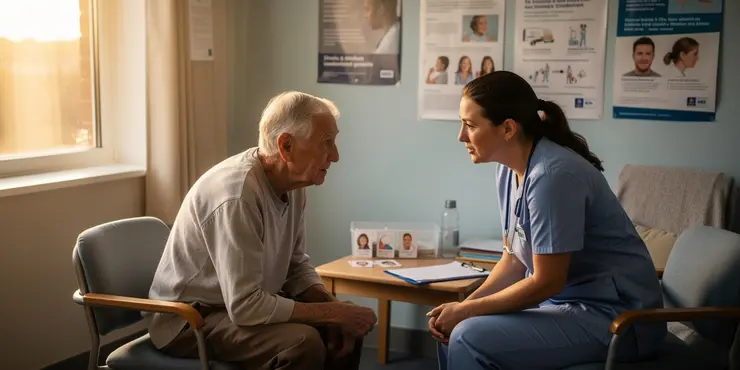
Stroke - Speech and Language Therapist's Experience
Relevance: 33%
-
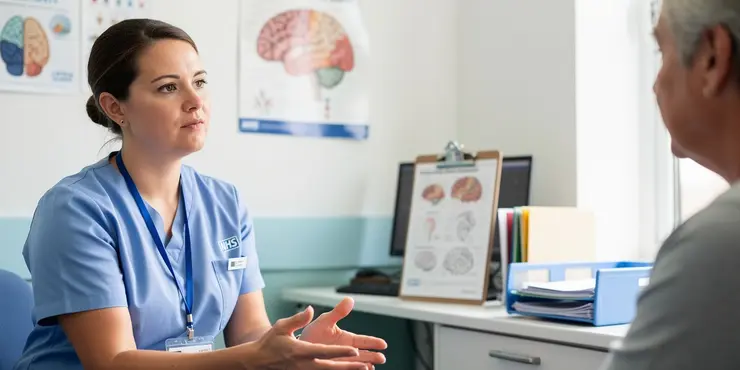
An introduction to frontotemporal dementia (FTD) (part 1/3)
Relevance: 22%
-
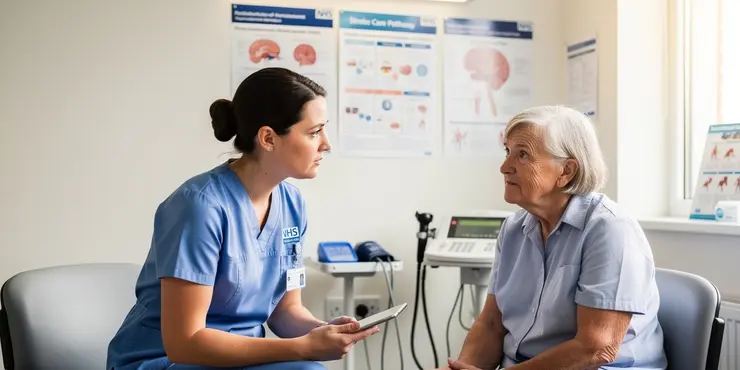
Gaining consent from stroke patients
Relevance: 21%
Joan's Story - Aphasia Awareness
Introduction to Joan's Condition
Joan, a lively and vibrant resident of Manchester, was living her life to the fullest when she suddenly experienced a life-altering event – a stroke. This unexpected medical emergency left her with aphasia, a condition that impairs the ability to communicate effectively. Joan's story provides a poignant insight into the challenges and triumphs faced by individuals with aphasia in the United Kingdom.
Understanding Aphasia
Aphasia is a communication disorder that results from damage to parts of the brain responsible for language. Commonly caused by strokes, it can also arise from head injuries, brain tumors, or infections. People with aphasia may struggle with speaking, understanding speech, reading, or writing. Despite its prevalence, awareness about aphasia remains low among the general public, contributing to significant challenges for those affected.
Joan's Journey with Aphasia
Following her stroke, Joan was thrust into a world where words often eluded her. Simple tasks such as asking for a cup of tea or following a conversation became monumental challenges. However, Joan refused to be defined by her condition. Through determination and support from her family and healthcare professionals, she embarked on her path to recovery, involving speech and language therapy as well as engagement with aphasia groups.
Community and Support in the UK
In the UK, various organizations offer support for individuals with aphasia and their families. The Stroke Association, for example, provides resources and support services that have been invaluable to Joan. Local aphasia groups offer a sense of community and a platform for individuals to share experiences, learn from one another, and practice their communication skills in a supportive environment.
Promoting Aphasia Awareness
Joan's experience highlights the importance of raising aphasia awareness across the UK. Greater awareness can ensure that individuals with aphasia receive timely and effective support, and help combat the social isolation often associated with communication disorders. By sharing stories like Joan's and promoting educational initiatives, we can foster a more inclusive society where everyone can communicate with confidence.
Conclusion
Joan's story is a testament to resilience and the human spirit. Despite the hurdles posed by aphasia, her determination to reclaim her voice and her life is inspiring. By understanding and raising awareness about aphasia, we can create a more supportive environment for those affected and ensure they are not alone on their journey.
Joan's Story - Aphasia Awareness
Introduction to Aphasia
Aphasia is a communication disorder caused by damage to the brain, often as a result of a stroke. It affects language abilities, hindering speech and understanding. In the United Kingdom, awareness of aphasia is crucial to ensuring that individuals like Joan receive the support and understanding they need.
Joan's Journey with Aphasia
Joan was a vibrant 65-year-old woman living in Manchester. She was a lover of words, often spending her afternoons reading novels or chatting with friends. However, a sudden stroke changed Joan's life, leaving her with aphasia. The words that once flowed easily became tangled and elusive, impacting her confidence and daily interactions.
Challenges and Triumphs
Initially, Joan faced numerous challenges. Everyday tasks like ordering coffee or engaging in friendly conversations became daunting. With the support of her family, speech therapists, and local aphasia groups, Joan began to rebuild her communication skills. Slowly, Joan learned alternative communication methods, such as gestures and writing, to express herself effectively.
Aphasia Awareness in the UK
Raising awareness in the UK is essential to provide better resources and support for those affected by aphasia. Educational campaigns and community programs play a vital role in spreading knowledge about the condition. Joan's story serves as a reminder of the resilience of individuals affected by aphasia and the importance of compassion and patience from society.
Conclusion
Joan’s story highlights the journey from adversity to empowerment, showcasing the significant impact of awareness and support. Increased aphasia awareness in the UK can lead to more inclusive communities where individuals like Joan are valued and understood.
Joan's Story - Understanding Her Condition
About Joan and Her Health
Joan is an energetic woman who lives in Manchester. She was happy and busy until she had a stroke. A stroke is a sudden health problem. It changed her life. After the stroke, Joan got a condition called aphasia. Aphasia makes talking and understanding others hard. Joan's story shows what people with aphasia go through in the UK.
What is Aphasia?
Aphasia is a problem with talking and understanding words. It happens when the part of the brain that controls language gets damaged. Strokes often cause aphasia. Other causes can be head bumps, brain growths, or infections. People with aphasia may have trouble speaking, listening, reading, or writing. Not many people know about aphasia, which makes it hard for those who have it.
Joan's Life with Aphasia
After her stroke, Joan had trouble finding words. Simple things, like asking for tea, became hard. But Joan stayed strong. She didn't let aphasia stop her. With help from her family and doctors, Joan started getting better. She joined speech and language therapy. She also went to groups for people with aphasia.
Help and Support in the UK
There are groups in the UK that help people with aphasia. The Stroke Association is one of them. They give advice and support that really helped Joan. There are also local groups where people can talk to others with aphasia. These groups give people a chance to learn from each other and practice talking in a safe place.
Spreading the Word About Aphasia
Joan's story shows why it's important for more people to know about aphasia. If more people know, those with aphasia can get help faster. It can also stop them from feeling lonely. Sharing stories like Joan's can teach people and make them understand how they can help others with communication problems.
The End of Joan's Story
Joan's journey is about being strong. Even though aphasia is a big challenge, she worked hard to talk and live her life again. If we learn about aphasia and help others know about it, we can make a better place for everyone who needs support. We can make sure they don't feel alone.
Joan's Story - Aphasia Awareness
What is Aphasia?
Aphasia is when it's hard to talk or understand words because of brain damage. This can happen after a stroke. In places like the United Kingdom, people need to know about aphasia so they can help people like Joan.
Joan’s Experience with Aphasia
Joan is 65 years old and lives in Manchester. She loved reading books and talking with her friends. But then, she had a stroke, and now she has aphasia. This made it hard for Joan to find words. She felt less confident and talking became difficult.
Overcoming Problems
At first, Joan found many things hard to do. Simple tasks like buying coffee or chatting with friends were tough. But, with help from her family, therapists, and support groups, Joan started to talk again. She learned new ways to share her thoughts, like using her hands to gesture and writing.
Important Aphasia Awareness in the UK
People in the UK need to know more about aphasia to help those who have it. Teaching people and having community programs can help spread understanding. Joan's story shows how strong people with aphasia can be. It also shows why we should be kind and patient.
End of Joan’s Story
Joan's story shows how she became strong with help from others. If more people in the UK know about aphasia, it can make communities better for everyone, including people like Joan.
Frequently Asked Questions
What is aphasia?
Aphasia is a communication disorder that affects a person's ability to process and use language, often resulting from a stroke or brain injury.
How did Joan acquire aphasia?
Joan developed aphasia following a stroke, which affected the language centres of her brain.
What are common symptoms of aphasia?
Symptoms include difficulty speaking, understanding speech, reading, writing, and finding the right words.
Can people with aphasia improve their communication skills?
Yes, with speech therapy and support, many individuals with aphasia can improve their communication abilities.
How did Joan cope with her aphasia?
Joan attended regular speech therapy sessions, used communication aids, and received support from her family and friends.
What support systems are available for people with aphasia in the UK?
Support is available through organisations like the Stroke Association, NHS services, and local support groups.
How can family and friends help someone with aphasia?
Patience, clear communication, and encouragement are key. Familiarity with communication tools and strategies learned in therapy can also help.
Is aphasia the same for everyone?
No, aphasia varies widely in severity and impact depending on the location and extent of brain damage.
What types of therapy are beneficial for aphasia?
Speech and language therapy is most common, but music therapy and group therapy can also be helpful.
Are there any technological aids to assist with aphasia?
Yes, there are various apps and devices designed to aid communication for those with aphasia.
Can people with aphasia regain full language ability?
While some may experience significant recovery, full language restoration can be a challenging goal and varies per individual.
How does aphasia affect daily life for those like Joan?
Aphasia can impact daily communication, making social interactions and tasks like reading and writing difficult.
What role does the community play in supporting those with aphasia?
Communities can provide critical support by fostering understanding, inclusion, and offering resources for rehabilitation.
Is there a cure for aphasia?
While no definitive cure exists, ongoing therapy and support can help manage and improve symptoms over time.
Can aphasia occur in younger individuals?
Yes, while more common in older adults, aphasia can occur in younger individuals, typically following a brain injury or neurological event.
What is aphasia?
Aphasia is when a person has trouble speaking or understanding words.
If someone has aphasia, they may find it hard to talk, read, or write. They might not understand what people say to them.
People with aphasia can use pictures or gestures to help them communicate.
Speech therapy can help people with aphasia feel better and talk more easily.
Aphasia makes talking and understanding words hard. It happens when someone hurts their brain, like from a stroke.
How did Joan get aphasia?
Joan had a stroke. This hurt the part of her brain that helps with talking.
What are common signs of aphasia?
Aphasia makes it hard to talk or understand.
Here are some signs:
- Finding it hard to think of the right words
- Not understanding what people say
- Saying wrong words
- Mixing up sounds or words
- Trouble reading or writing
If someone has these signs, picture books or pointing to objects can help.
You might find it hard to talk, understand others, read, write, or think of the right words.
Can people with aphasia get better at talking and understanding?
Yes, with help from a speech therapist and extra support, many people with aphasia can get better at talking and understanding others.
How did Joan handle her speech problems?
Joan had a hard time speaking because of her condition. Here are some ways that helped her:
- Practice: Joan practiced talking every day. This helped her get better a little at a time.
- Pictures: She used pictures to help her say what she wanted.
- Games and Apps: Joan played special games and used apps on a tablet. These were fun and helped her learn words.
- Support from friends and family: Her friends and family talked with her slowly and helped her feel comfortable.
- Therapy: Joan worked with a speech therapist, who was a special teacher for speaking.
All these things helped Joan do better with her speech problems.
Joan went to speech classes to help her talk better. She also used special tools to help her communicate. Her family and friends helped her too.
What help is there for people with aphasia in the UK?
Aphasia is when people have trouble talking or understanding words. Here is some help that is available:
- Speech Therapists: These are special helpers who teach you how to talk and understand better.
- Support Groups: You can meet other people with aphasia. You can share stories and help each other.
- Apps and Tools: There are computer programs and apps that can help you practice speaking and listening.
- Family and Friends: Family and friends can learn how to help and support you at home.
- Charities and Helplines: Some places have phone numbers you can call to get help and advice.
If you or someone you know has aphasia, these are good ways to find help and support.
You can get help from places like the Stroke Association, NHS services, and support groups in your area.
How can family and friends help someone with aphasia?
Aphasia makes talking and understanding hard. Here are some ways family and friends can help:
- Be patient: Give them time to speak and listen to them carefully.
- Use simple words: Speak slowly and use easy words.
- Show pictures: Use pictures or drawings to help them understand.
- Write it down: Write things on paper if it's hard to say them.
- Use gestures: Use your hands and body to show what you mean.
- Stay positive: Encourage and support them. Tell them they are doing well.
These tips can make talking and understanding easier for people with aphasia.
Being patient, talking clearly, and saying nice things are important. Knowing how to use helpful tools and ideas from therapy can also help.
Is aphasia the same for everyone?
No, aphasia is not the same for everyone. People with aphasia have trouble with speaking, understanding, reading, or writing. It can be different for each person. Some people might find speaking hard, while others might have trouble understanding words.
Here are some tools and ways to help:
- Use pictures to help explain things.
- Write down important words.
- Speak slowly and clearly.
- Ask yes or no questions.
No, aphasia is different for each person. It changes based on where and how much the brain is hurt.
What kinds of treatment can help with aphasia?
If you have trouble speaking or understanding words, there are therapies that can help:
- Speech Therapy: A therapist can help you practice speaking and understanding words.
- Group Therapy: Talking with others in a group can help you feel more comfortable using words.
- Communication Tools: Devices with pictures or words can help you say what you need.
These tools and people can support you:
- Family and Friends: They can practice talking with you.
- Apps and Games: Some fun apps can help you learn words.
- Flashcards: Cards with pictures and words can help you remember.
Talking therapy is the most common. But music therapy and group therapy can help too.
Are there any tools to help with aphasia?
If you find it hard to speak or understand words, there are tools that can help. These tools are for people with aphasia.
Here are some tools that might help:
- Speech Apps: These apps help you talk or find the right words. They can speak words for you.
- Picture Cards: Use cards with pictures to show what you mean.
- Talking Devices: Some devices can talk when you press buttons with pictures or words.
- Computer Programs: These programs help you practice speaking and understanding words.
Ask a doctor or a speech therapist to help you choose the right tool.
Yes, there are different apps and devices that help people talk if they have trouble speaking.
Can people with aphasia get all their language skills back?
Aphasia is when someone has trouble speaking or understanding words. It often happens after a brain injury, like a stroke.
Some people with aphasia can get better with time and practice. They can work with doctors and therapists to improve their language skills.
Support tools like picture boards, speech apps, and practice games can help too. Everyone is different, so some people might not get all their skills back, but many can improve a lot.
Some people get much better, but getting all of your language skills back can be hard. Everyone is different.
How does aphasia affect Joan every day?
Aphasia makes it hard for Joan to talk, listen, read, and write.
Here are some ways to help Joan:
- Speak slowly and clearly.
- Use simple words.
- Use pictures or drawings to help.
- Be patient and give her time to think.
Aphasia makes talking and understanding others hard. It can also make it tough to read and write.
To help with aphasia, you can:
- Use pictures to show what you mean.
- Try speaking slowly and clearly.
- Write things down to help you remember.
Talking to a doctor or a speech therapist can also help. They know a lot about aphasia and can offer good advice.
How can the community help people with aphasia?
The community can do a lot to help people who have trouble speaking and understanding words. This is called aphasia.
Here are some ways the community can help:
- Be patient and give them time to speak or respond.
- Use simple words and short sentences when talking.
- Listen carefully and don't rush them.
- Use pictures, gestures, or writing to help them understand.
- Encourage them and be friendly and supportive.
It's important to make sure they feel included and understood.
Communities can help a lot. They do this by being kind, including everyone, and giving help when people need to get better.
Can aphasia be fixed?
Aphasia is a problem with speaking after the brain gets hurt.
There is no quick fix for aphasia.
But people can get better with time and help.
Speech therapy can help a lot.
Talking often with family and friends can also help.
Using pictures and simple words makes talking easier.
Tools like speech apps can be helpful too.
There is no cure yet, but with help and support, you can feel better and manage symptoms.
Can young people have aphasia?
Aphasia is a problem with talking and understanding words. It usually happens to older people after a stroke. But sometimes, it can happen to young people too. This can be because of a head injury or other brain problems.
If you know someone who's having trouble with words, tell a teacher or a doctor. They can help you understand and find helpful ways to communicate.
Using pictures or drawing can help make things clearer for people with aphasia. There are also special apps and tools that can help with talking and understanding. Always ask for help if you need it.
Yes, younger people can get aphasia too. This usually happens after a brain injury or if something happens to the brain.
Helpful tips:
- Use simple words.
- Speak slowly.
- Use pictures to help explain.
Useful Links
This website offers general information and is not a substitute for professional advice.
Always seek guidance from qualified professionals.
If you have any medical concerns or need urgent help, contact a healthcare professional or emergency services immediately.
Some of this content was generated with AI assistance. We’ve done our best to keep it accurate, helpful, and human-friendly.
- Ergsy carfully checks the information in the videos we provide here.
- Videos shown by Youtube after a video has completed, have NOT been reviewed by ERGSY.
- To view, click the arrow in centre of video.
- Most of the videos you find here will have subtitles and/or closed captions available.
- You may need to turn these on, and choose your preferred language.
- Go to the video you'd like to watch.
- If closed captions (CC) are available, settings will be visible on the bottom right of the video player.
- To turn on Captions, click settings .
- To turn off Captions, click settings again.
More Items From Ergsy search
-

Joan's story - Aphasia Awareness
Relevance: 100%
-

South Tees NHS - What is aphasia and how can you help?
Relevance: 87%
-

Stroke - Speech and Language Therapist's Experience
Relevance: 33%
-

An introduction to frontotemporal dementia (FTD) (part 1/3)
Relevance: 22%
-

Gaining consent from stroke patients
Relevance: 21%

